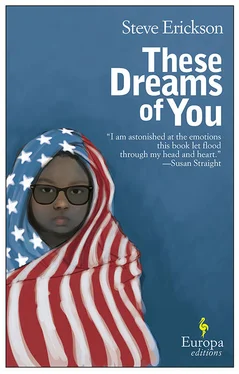“If we do this, remember to bring the angry woman with you. I’ll need her.”
“I’m not an angry woman.”
“Bring the one with the sense of humor then.”
“I’ll bring them all,” and with a start she’s unsettled by how much he already looks like a phantom. “There’s more than one.”
“Yeah? Try being me .”
He already looks like a phantom, and on the campaign trail over the next four months, he forever seems on the verge of falling apart. When he speaks to crowds he shakes, rushing through speeches when he’s not stumbling; sometimes the words run into each other as if spoken by a drunk man or, worse, a man seized by a stroke. On planes and buses after each rally, he crumples into seats, passing out in a sweat, fevered by dark providences and the irredeemable. He’s bleached of color, seems to be disappearing before everyone’s eyes. He already was old before his time when she met him in London nearly two years ago and now he’s older still.
But then he gathers intensity, prying himself loose from the grip of whoever he was in the past, now in pursuit of something inside him that he no longer can refuse to believe in — and finally catching it, though he can’t be sure that it hasn’t caught him. He holds out to the crowd his open hand as if it’s filled with a beating heart pulled from his own chest, and his persona is made raw; the motorcade moves down the street and men twice his size, their knees and hands bloodied, have to hold him around the waist so he’s not pulled away by the crowd who would disrobe him, pick him clean of his cufflinks and tie and shoes, benignly strip him as naked as their feelings for him and his for them or, more ferociously, divide him up among them in pieces. He refuses to allow about the campaign the air of celebration on which campaigns depend. When he whispers to her at a rally in Los Angeles, These are my people , it’s not a boast; he derives from it as little exhilaration as he does from the rest. He won’t reconcile himself to the old rituals of politics or to even the rituals of new politics that he in part invented. He’s come to be mortified by the political truisms to which he once devoted himself.
The campaign is shambolic, a moving pandemonium. More than anything it resembles an act of penance, the lashed slog from one station of the cross to the next; when he unconsciously touches the heads of poor children, brushes their cheeks with a finger, it’s more priestly than political. Jasmine can’t imagine how, if he manages to get elected, he’ll survive the job — not because he isn’t tough enough, certainly not because he isn’t committed enough, but because he’s altogether too committed, because he gives altogether too much, beyond what any sane self can stand or give. Retreating to the edges of staff meetings where he lies on a couch saying nothing as some point of strategy is hashed over, he ends arguments with decisions so succinct and raging (“Indiana is essential, we need to not just win there but crush ”) that Jasmine can only be mystified by the method and math of democrazy that she’s come to spell with a z.
Wild and frenzied from kansan desolations that no foreigner can imagine short of the moon, where white college students chase the bus and train just to call to him the goodbyes that will be unbearable to remember in three months, to indianan victories not crushing enough, to oregonian defeats that leave him precarious on the edge of political oblivion, little of it seems to have bearing on what he speaks of to privileged and working-class alike: the rats of the black tenements and the self-killing grounds of Indian reservations, delano daughters with hands stained by the vineyards on which they barely subsist and delta sons with bodies misshapen by hunger. This is prosperity, he bays at them beneath montana nights, calculated as much by what’s polluted, what’s killed, what’s secured and incarcerated, but never by a child’s delight, a poem’s spell, the immutable power of a kept promise. It’s a prosperity that measures everything that means nothing and nothing that means everything. It tells all of us, he concludes to the crowds, everything about our country except why it’s ours.
There’s another sort of murder, he warns — and does he intend it as prophecy? or does the prophetic just come naturally, not by virtue of what he foresees but what he knows in his bones — a sort of murder as fatal as the sniper’s gunshot, and that’s the violence of the institution that never sees the poor in their rags or hears the sob of the hungry or feels the touch of the forsaken. This violence shatters the spirit. It not only accepts but advances the premise that this is a country where it’s acceptable to succeed by destroying people’s dreams and breaking their hearts.
Jasmine has no way of knowing that this campaign is singularly different from any other. It reminds her more of a concert tour not just in its organization but its entropy. Glumly assessing a campaign poster of himself, he says, “Am I a Beatle?” and winks at her about the inside joke; but when the crowds tear his clothes and steal his shoes, wanting a handful of his hair that grows longer, she realizes this is on another level from what she’s expected let alone known. “Are all campaigns over here like this?” she finally asks an aide in one of the Los Angeles suburbs. This is on an afternoon when, casting aside her clipboard, she pulls to safety a teenage boy a few years younger than she is, who’s been lifted off his feet by the crowd and nearly pulled under to be trampled or crushed. The aide doesn’t have to answer, given the look on his face, but does anyway. “No campaign,” he says, “has ever been like this,” and in his face she sees the terror at what’s been unleashed that no one can control.
Pulled from the crowd, the teenage boy hears Jasmine — leaning close to his face — whisper in his ear a single word; and though Jasmine wouldn’t dispute that she did so, she has no distinct recollection of it though it isn’t a word that would surprise either of them if they could relive the moment, stop and catch the word in the air and hear it again.
There’s more than one of me, she said to him that afternoon months before, back in the capitol, and he answered, “Try being me,” and she sees all the versions of him in the room of an Indianapolis Marriott on an early-April night of murder that can’t help feeling to everyone like a foretelling. The network reportage from the television in the other room is on a kind of loop, delivering the same news over and over so as to try and shake off the shock of it; and dozing on the bedroom floor she still can hear people crying in other parts of the suite but she’s moved most by the silence from outside, since alone among all cities tonight, on this particular night this particular city isn’t gripped by riot because the man who lies on the bed a few feet away in the same room dared to go break the news to a black crowd in the ghetto a few hours ago, a few miles away.
It was cold that night but the rain was fine and dry like ash blown in from the southwest all its way from that motel balcony in Memphis, and the torchlight was still the red haze of the mind’s fires not yet lit. When they first drove up to the rally it wasn’t clear how many had heard the news, only that most hadn’t, especially those who came early so they could be within touching distance, or spitting distance a few feet back, or shooting distance a few more feet back.
An aide hurriedly scribbled some brief remarks for him— and then please Senator let’s get the fuck out of here . But stepping from the car, taking the first step up to the platform to address everyone, each and every face before him black, he crumpled the speech and stuck it in his overcoat pocket and just went up and told them. He’s dead. Shot and killed tonight, he told them — and then he talked not for a minute or two or five but nearly ten, talked over the roar of gunfire heard in his mind’s ear four and a half years since Dallas, “so go home tonight,” he told them, “and yes say a prayer for Dr. King and his family, but say one too for our country that we love,” and for those close enough to see, the pain in his eyes was his passport to theirs, the signal of truth and his right to say it and theirs to hear it.
Читать дальше











